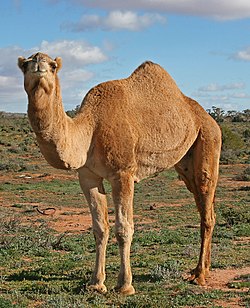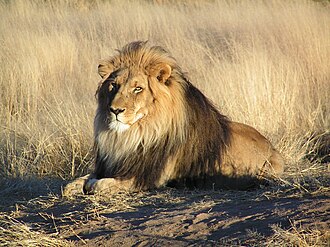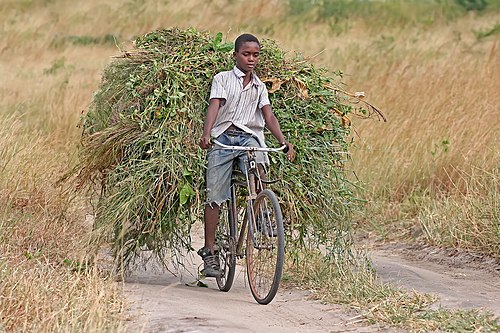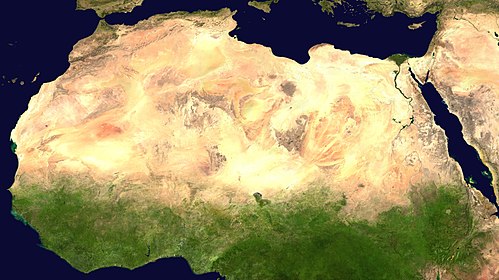Portal:Africa



Africa is the world's second-largest and second-most populous continent after Asia. At about 30.3 million km2 (11.7 million square miles) including adjacent islands, it covers 20% of Earth's land area and 6% of its total surface area. With nearly 1.4 billion people as of 2021, it accounts for about 18% of the world's human population. Africa's population is the youngest among all the continents; the median age in 2012 was 19.7, when the worldwide median age was 30.4. Based on 2024 projections, Africa's population will exceed 3.8 billion people by 2100. Africa is the least wealthy inhabited continent per capita and second-least wealthy by total wealth, ahead of Oceania. Scholars have attributed this to different factors including geography, climate, corruption, colonialism, the Cold War, and neocolonialism. Despite this low concentration of wealth, recent economic expansion and a large and young population make Africa an important economic market in the broader global context, and Africa has a large quantity of natural resources.
Africa is highly biodiverse; it is the continent with the largest number of megafauna species, as it was least affected by the extinction of the Pleistocene megafauna. However, Africa is also heavily affected by a wide range of environmental issues, including desertification, deforestation, water scarcity, and pollution. These entrenched environmental concerns are expected to worsen as climate change impacts Africa. The UN Intergovernmental Panel on Climate Change has identified Africa as the continent most vulnerable to climate change.
The history of Africa is long, complex, and varied, and has often been under-appreciated by the global historical community. In African societies the oral word is revered, and they have generally recorded their history via oral tradition, which has led anthropologists to term them "oral civilisations", contrasted with "literate civilisations" which pride the written word. African culture is rich and diverse both within and between the continent's regions, encompassing art, cuisine, music and dance, religion, and dress.
Africa, particularly Eastern Africa, is widely accepted to be the place of origin of humans and the Hominidae clade, also known as the great apes. The earliest hominids and their ancestors have been dated to around 7 million years ago, and Homo sapiens (modern human) are believed to have originated in Africa 350,000 to 260,000 years ago. In the 4th and 3rd millennia BCE Ancient Egypt, Kerma, Punt, and the Tichitt Tradition emerged in North, East and West Africa, while from 3000 BCE to 500 CE the Bantu expansion swept from modern-day Cameroon through Central, East, and Southern Africa, displacing or absorbing groups such as the Khoisan and Pygmies. Some African empires include Wagadu, Mali, Songhai, Sokoto, Ife, Benin, Asante, the Fatimids, Almoravids, Almohads, Ayyubids, Mamluks, Kongo, Mwene Muji, Luba, Lunda, Kitara, Aksum, Ethiopia, Adal, Ajuran, Kilwa, Sakalava, Imerina, Maravi, Mutapa, Rozvi, Mthwakazi, and Zulu. Despite the predominance of states, many societies were heterarchical and stateless. Slave trades created various diasporas, especially in the Americas. From the late 19th century to early 20th century, driven by the Second Industrial Revolution, most of Africa was rapidly conquered and colonised by European nations, save for Ethiopia and Liberia. European rule had significant impacts on Africa's societies, and colonies were maintained for the purpose of economic exploitation and extraction of natural resources. Most present states emerged from a process of decolonisation following World War II, and established the Organisation of African Unity in 1963, the predecessor to the African Union. The nascent countries decided to keep their colonial borders, with traditional power structures used in governance to varying degrees. (Full article...)
Selected article –

Climate change in Africa is an increasingly serious threat as Africa is among the most vulnerable continents to the effects of climate change. Some sources even classify Africa as "the most vulnerable continent on Earth". Climate change and climate variability will likely reduce agricultural production, food security and water security. As a result, there will be negative consequences on people's lives and sustainable development in Africa.
Over the coming decades, warming from climate change is expected across almost all the Earth's surface, and global mean rainfall will increase. Currently, Africa is warming faster than the rest of the world on average. Large portions of the continent may become uninhabitable as a result of the rapid effects of climate change, which would have disastrous effects on human health, food security, and poverty. Regional effects on rainfall in the tropics are expected to be much more spatially variable. The direction of change at any one location is often less certain. (Full article...)
Featured pictures –
Did you know (auto-generated) -

- ... that nursing educator Helen Turner Watson was one of the first African-American women to become a commissioned officer in the United States Navy?
- ... that South African singer Tyla delayed her debut album's submission date in order to collaborate with Tems?
- ... that Susan Murabana created Africa's first permanent planetarium?
- ... that the political and media storm around so-called African gangs in Australia has been described by academics as a moral panic?
- ... that Erick Russell is the first openly gay African American elected to a statewide office in the United States?
- ... that during the First World War the East African Mounted Rifles sometimes painted stripes on their horses to camouflage them as zebras?
Categories
Selected biography –
Bantu Stephen Biko OMSG (18 December 1946 – 12 September 1977) was a South African anti-apartheid activist. Ideologically an African nationalist and African socialist, he was at the forefront of a grassroots anti-apartheid campaign known as the Black Consciousness Movement during the late 1960s and 1970s. His ideas were articulated in a series of articles published under the pseudonym Frank Talk.
Raised in a poor Xhosa family, Biko grew up in Ginsberg township in the Eastern Cape. In 1966, he began studying medicine at the University of Natal, where he joined the National Union of South African Students (NUSAS). Strongly opposed to the apartheid system of racial segregation and white-minority rule in South Africa, Biko was frustrated that NUSAS and other anti-apartheid groups were dominated by white liberals, rather than by the blacks who were most affected by apartheid. He believed that well-intentioned white liberals failed to comprehend the black experience and often acted in a paternalistic manner. He developed the view that to avoid white domination, black people had to organise independently, and to this end he became a leading figure in the creation of the South African Students' Organisation (SASO) in 1968. Membership was open only to "blacks", a term that Biko used in reference not just to Bantu-speaking Africans but also to Coloureds and Indians. He was careful to keep his movement independent of white liberals, but opposed anti-white hatred and had white friends. The white-minority National Party government were initially supportive, seeing SASO's creation as a victory for apartheid's ethos of racial separatism. (Full article...)
Selected country –
 |
 |
||

| |||
Uganda, formally the Republic of Uganda, is a landlocked country in East Africa, bordered on the east by Kenya, on the north by Sudan, on the west by the Democratic Republic of the Congo, on the southwest by Rwanda, and on the south by Tanzania. The southern part of the country includes a substantial portion of Lake Victoria, within which it shares borders with Kenya and Tanzania. The country is located on the East African plateau, averaging about 900 metres (2,950 ft) above sea level. Uganda takes its name from the Buganda kingdom, which encompasses a portion of the south of the country including the capital Kampala.
The President of Uganda, currently Yoweri Museveni, is both head of state and head of government. The president appoints a prime minister who aids him in his tasks. The current prime minister is Apolo Nsibambi. The parliament is formed by the National Assembly, which has 303 members. Eighty-six of these members are nominated by interest groups, including women and the army. The remaining members are elected for five-year terms during general elections. (Read more...)
Selected city –

Port Said (/saɪd/, Egyptian Arabic: بورسعيد, romanized: Bōrsaʿīd, pronounced [boɾsæˈʕiːd, poɾ-]) is a port city that lies in the northeast Egypt extending about 30 km (19 mi) along the coast of the Mediterranean Sea, straddling the west bank of the northern mouth of the Suez Canal. The city is the capital of the Port Said governorate and it forms the majority of the governorate, where its seven districts comprise seven of the governorate's eight regions. At the beginning of 2023 it had a population of 680,375 people.
The city was established in 1859 during the building of the Suez Canal. There are numerous old houses with grand balconies on all floors, giving the city a distinctive look. Port Said's twin city is Port Fuad, which lies on the eastern bank of the Suez Canal. The two cities coexist, to the extent that there is hardly any town centre in Port Fuad. The cities are connected by free ferries running all through the day, and together they form a metropolitan area with over a million residents that extends both on the African and the Asian sides of the Suez Canal. (Full article...)
In the news
- 22 April 2025 –
- Interpol rescues 33 West Africans, including people from Benin, Togo, Burkina Faso, and Ghana, from human trafficking rings in the Ivory Coast. (AP)
- 21 April 2025 – Spillover of the Sudanese civil war
- 2025 Nasir clashes
- The South Sudan People's Defence Forces capture the town of Nasir in Upper Nile State from the Nuer White Army. (Reuters)
- 21 April 2025 – Boko Haram insurgency
- The Islamic State claims responsibility for a series of deadly attacks targeting Christians and security forces in Borno and Adamawa, Nigeria earlier this month that killed at least nine people and injured several others. (Reuters)
- 21 April 2025 – 2025 Boston Marathon
- In long-distance running, Kenyan road runner John Korir wins the men's competition at the Boston Marathon with a time of 2:04:45 which, along with his brother Wesley Korir's win in 2012, makes them the first and only set of brothers to win the event. Fellow Kenyan athlete Sharon Lokedi wins the women's competition with a time of 2:17:22 and sets the new course record, surpassing Buzunesh Deba's record in 2014. (The New York Times) (WBZ-TV)
- 19 April 2025 – Herder–farmer conflicts in Nigeria
- The death toll from clashes between cattle herders and farmers earlier this week in Benue State, Nigeria, rises to 56. (Barron's)
Updated: 23:05, 22 April 2025
General images -
Africa topics
More did you know –
- ...that Iyabo Obasanjo-Bello, a Nigerian Senator from the People's Democratic Party, is the daughter of former President Olusegun Obasanjo?
- ...that the 2007 South Africa miners' strike, which impacted over 240,000 workers, was the first ever industry-wide miners' strike in the history of South Africa?
- ...that Seleh Leha, a town in Tigray Region in northern Ethiopia, was the site of a leprosarium built during the Italian occupation of East Africa and abandoned in 1941?
- ...that Sarir field, an oil field in Cyrenaica operated by the Arabian Gulf Oil Company (AGOCO), is considered to be the largest in Libya, with estimated oil reserves of 12 Gbbl (1.9×109 m3)?
Related portals
Major Religions in Africa
North Africa
West Africa
Central Africa
East Africa
Southern Africa
Associated Wikimedia
The following Wikimedia Foundation sister projects provide more on this subject:
-
Commons
Free media repository -
Wikibooks
Free textbooks and manuals -
Wikidata
Free knowledge base -
Wikinews
Free-content news -
Wikiquote
Collection of quotations -
Wikisource
Free-content library -
Wikispecies
Directory of species -
Wikiversity
Free learning tools -
Wikivoyage
Free travel guide -
Wiktionary
Dictionary and thesaurus

























































































